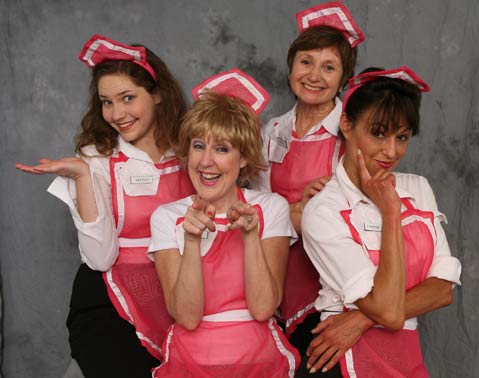Stoop
Presented by Drama Dogs, at Center Stage Theater, Saturday, June 28.

From left: Lauren Parsons, Carol Metcalf, E. Bonnie Lewis, and Deborah Helm.
Given 10 women of different ages and sizes, one would assume separate identities, separate purposes, and separate lives, but over the course of this evening, a hard truth emerges-women possess nothing, not even themselves. Stoop, an evening directed by E. Bonnie Lewis and comprised of three one-acts about women, showed a society that forces a woman to submit, not necessarily to her male counterpart but rather to virtually anyone, and to succumb to emotional, mental, and physical abuse. Gender bias compels these women to “stoop” in order to survive. And although a woman may resist this pressure, her emotional conscience and deep inner struggle tend to prevent total commitment even to her own resistance.
Stoop thrusts its actors and the audience into a series of situations that a woman might experience throughout her life. In the title piece, the woman finds herself to have become old and cynical. Two women (Suzi Bodine and Ethel Scar) contemplate the usual aches, annoyances, and life questions. In the second play, “Lives of the Great Waitresses,” we meet four very different women: one with an itch to convert anyone in her path (Carol Metcalf), a second with a “heart as big as a butterball turkey” (Deborah Helm), a third with years of experience backing up her waitress’s pride (E. Bonnie Lewis), and finally a fourth who is too perky for her own good (Lauren Parsons).
The final play, called “The Most Massive Woman Wins,” shows four women (Dana Halverson, Michelle Osborne, Rani Apodaca, and Michelle Wilcox) waiting in a liposuction clinic. From purposefully setting herself on fire to hear the fat fry off her body (Michelle Osborne) to surrendering to a natural desire to get laid (Rani Apodaca), each woman delves into the depths of her bodily experience to excuse her pending transformation.
While Stoop easily reaches out to any woman, at times it appeared somewhat too complicated for the not-so-sensitive man. These powerful performances were filled with reality-check moments that succeeded in exposing the strength and complexity that allows women to survive in our contemporary world. Through the phenomenal acting of these women, Stoop brought 10 female characters fully to life. The message is summed up in a line from the title show, in which one of the old women says, “I told him, ‘If I could get up again when I stoop, then I’d stoop.'”



